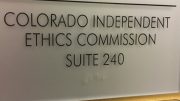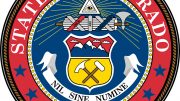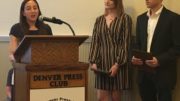Below is the text of a letter sent by the Colorado Freedom of Information Coalition on Thursday, Oct. 13, to House Speaker Alec Garnett, House Majority Leader Daneya Esgar, Senate President Stephen Fenberg and Senate Majority Leader Dominick Moreno.
We are the president and executive director of the Colorado Freedom of Information Coalition, a nonpartisan alliance of news organizations, citizen groups and individuals dedicated to ensuring the transparency of state and local governments in Colorado by promoting freedom of the press, open courts and open access to government records and meetings.
CFOIC urges you and the entire Democratic caucus to stop the practice, detailed in a recent report by KUNC reporter Scott Franz, of using secret ballots to help determine whether bills with fiscal notes will live or die during the legislative session. Without serious question, this process deprives the public of its right to observe important decision making — in real time — as the Colorado Open Meetings Law (COML) requires.
The anonymous “quadratic voting” system as described by KUNC violates both the spirit and letter of the COML, which declares it “to be a matter of statewide concern and the policy of this state that the formation of public policy is public business and may not be conducted in secret.” In particular:
- It is contrary to the Colorado Supreme Court’s 1983 ruling in Cole v. State, which held that legislative caucus meetings are subject to the COML. “While a legislative caucus is not an official policy-making body of the General Assembly, it is, nonetheless, a ‘de facto’ policy-making body which formulates legislative policy that is of governing importance to the citizens of this state,” the Court wrote. “In effect,” the Justices noted, “the floor vote on a measure when a caucus position has [previously] been taken, especially in appropriation matters, is little more than a formality.”
- The COML prohibits meetings among elected officials via email or other electronic means unless the public is provided notice and the opportunity to observe the meeting as it transpires. As you know, the COML requires a state public body to open meetings of two or more members “at which any public business is discussed.” When legislators fill out these surveys, and the results are shared with other legislators, they are in effect discussing and deciding public business out of public view. Moreover, because the public is barred from seeing who voted “yay” and who voted “nay” on any proposed measure, they are also deprived of observing how each of their elected officials acted in exercising official authority.
- The COML expressly prohibits a public body from using secret ballots to adopt any “position.” As reported by KUNC, Sen. Chris Hansen in a 2020 interview described the quadratic voting process as “a secret ballot, essentially.” Eight years earlier, in 2012, lawmakers banned anonymous voting in House Bill 12-1169.
The public is entitled to know which of their elected legislators favored or opposed certain measures under consideration at the Capitol, in votes that have had real-world, bill-killing consequences. Not only should the public be permitted to observe the voting process in real time under the COML, the Colorado Open Records Act (CORA) requires disclosure of the records of these votes.
We dispute the legislature’s conclusion that the voting records are “work product” as defined by CORA. The official display of “thumbs up” or “thumbs down” on a proposed bill, whether in writing, hand gestures (a la John McCain), or any other means of communication is the essence of the “formation of public policy,” not “documents prepared or assembled by a member of the general assembly relating to the drafting of bills or amendments.” A “yay” or “nay” vote, with nothing more, cannot possibly constitute “deliberative materials assembled for the benefit of elected officials, which materials express an opinion or are deliberative in nature.”
Additionally: 1) The COML requires state public bodies to take and promptly record minutes of any meeting of a state public body, “and such records shall be open to public inspection.”; 2) the Court of Appeals held in Gumina v. City of Sterling that records of an illegally closed meeting are not subject to the COML’s privilege against non-disclosure; and 3) CORA excludes from its definition of “work product” not subject to disclosure any materials “that would otherwise constitute work product if such materials are produced and distributed to the members of a public body for their use or consideration in a public meeting.”
As the KUNC story described, the quadratic voting system was first used in the House Appropriations Committee “when several big bills were competing against each other for funding.” Just as that committee violated the COML on that occasion, the Democratic caucus continues to do so through its use of secret ballots among two or more members of the state public body.
Next month marks the 50th anniversary of voter approval of the Colorado Sunshine Law, which includes the Colorado Open Meetings Law. The legislature should celebrate this milestone by abandoning a secret process that flies in the face of the government transparency voters first put into law in 1972 and still are entitled to today.
Thank you for your consideration.
Respectfully,
Steve Zansberg, president Jeffrey A. Roberts, executive director
Positions taken by the Colorado Freedom of Information Coalition may not necessarily represent the positions of each individual member or member organization.
Follow the Colorado Freedom of Information Coalition on Twitter @CoFOIC. Like CFOIC’s Facebook page. Do you appreciate the information and resources provided by CFOIC? Please consider making a tax-deductible donation.




